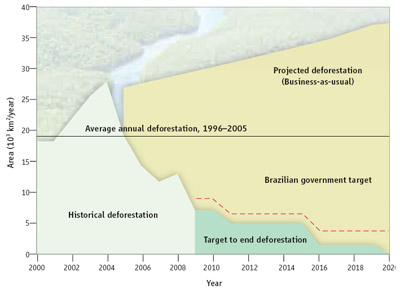 Mongabay.com reports more good news about the dramatic environmental, economic, cultural and other benefits of climate change solutions:
Mongabay.com reports more good news about the dramatic environmental, economic, cultural and other benefits of climate change solutions:Funds generated under a U.S. cap-and-trade or a broader U.N.-supported scheme to reduce greenhouse gas emissions from deforestation and degradation ("REDD") could play a critical role in bringing deforestation in the Brazilian Amazon to a halt, reports a team writing in the journal Science.
Analyzing Brazil's plan to cut Amazon forest clearing by 70 percent over the next decade and current efforts by major Brazilian beef and soy producers to exclude deforesters from the supply chain, Dan Nepstad of the Woods Hole Research Center and colleagues lay out a scenario under which net forest loss in the Brazilian Amazon could fall to zero by 2020. The external cost of the effort would be $7 to $18 billion, or 13-33 percent of what Americans spend annually on diet foods and beverages.
Roughly half the payments would go towards establishing a forest peoples' fund to pay for "community forest-based economic activities, health, education, and cultural preservation for the region's indigenous, and traditional forest peoples and smallholder farmers."
Ending deforestation in the Brazilian Amazon would reduce global carbon emissions 2-5 percent, safeguard the planet's largest reservoir of terrestrial biodiversity, and ensure the continued provision of critical ecosystem services for Brazil and the world. It would also clearly establish Brazil as the leading player in the environmental services market, a sector expected to be worth hundreds of billions of dollars annually in the next 20 years. Brazil's reduction in emissions from deforestation could alone generate $37 billion to $111 billion between 2013 and 2020 in revenue, some of which could be used to expand the program to end deforestation.
Finally, eliminating Amazon deforestation in Brazil would send a powerful message to other countries, showing that it is indeed possible to protect the environment and benefit economically.
The boldfaced text is my own emphasis added. It blows me away that for 13-33% of what Americans spend annually on diet food and beverages, we can protect the precious ecosystem services and astounding biodiversity of the Amazon. Better yet, this type of investment in conservation should have tremendous returns for Brazil. This is because with its abundant rainforest lands, the country stands to become a leading player in the emerging Environmental Services market.
It's almost a land conservation equivalent of investments in energy efficiency and clean energy. Payments made to successfully protect the Amazon are not a simple costs. They are wise investments that will pay for themselves -- often not only economically, but in terms of human health, security, and other ways that are beneficial to human well-being.
Read more>>
...
No comments:
Post a Comment